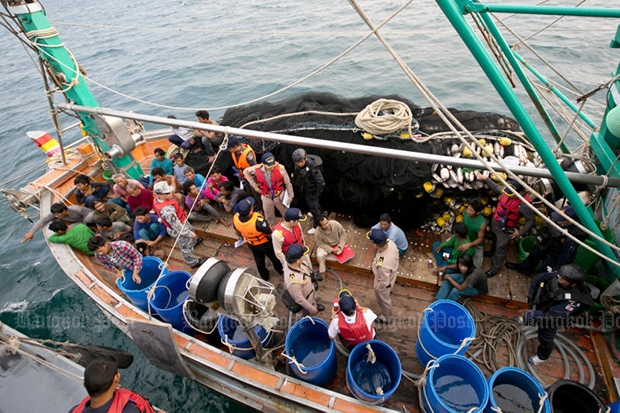
The European Union has decided to give Thailand another six months to tackle illegal fishing before the next appraisal, Deputy Prime Minister Prawit Wongsuwon says.
The EU issued a yellow-card warning to Bangkok in April last year urging faster progress in combating illegal, unreported and unregulated (IUU) fishing.
If it fails to address the issue, Thailand risks getting a red card, which means the EU would ban the country's seafood imports.
Gen Prawit said yesterday it is good news that the EU has yet to issue Thailand with a red card and give the country more time to continue efforts to deal with the issue.
His comment came after he received a report from a Thai delegation sent to negotiate with EU representatives.
The deputy premier said the move would be a boon for the country's economy, adding that many countries have been reportedly downgraded for failing to combat illegal fishing.
The EU praised Thailand for its work in dealing with the problem, he said, and though several issues have yet to be addressed, the bloc considers the country has made a determined effort to deal with the matter.
The deputy premier said an EU technical team is expected to come to Thailand late next month and its main team the following month to give recommendations to Thailand on the problem.
Several issues have yet to be addressed, particularly the installation of tracking systems on fishing trawlers and the enforcement of laws, according to Gen Prawit.
Meanwhile, Somboon Siriraksophan, policy and programme coordinator at Southeast Asian Fisheries Development Centre based in Thailand, said yesterday that IUU fishing remains a big challenge for the Asean community as member states still lack common fishing management policies.
"Despite the Asean guidelines to tackle illegal fishing activities, the community needs to show greater commitment by diminishing the level of differences in anti-illegal fishing measures", he said, citing the Asean guidelines for Preventing the Entry of Fish and Fishery Products from IUU Fishing Activities into the Supply Chain.
He was speaking at the "14th Infofish World Tuna Trade Conference and Exhibition" seminar in Bangkok.
"[Asean] needs to harmonise its restrictions on fishing activities, for example, entry into ports, inspection, access to port services and other enforcement in order to be on par with the global fishing system," Mr Somboon noted.
He also urged Asean governments to come up with a single traceability system as a way of sustaining fishing resources in the Southeast Asian region for years to come.